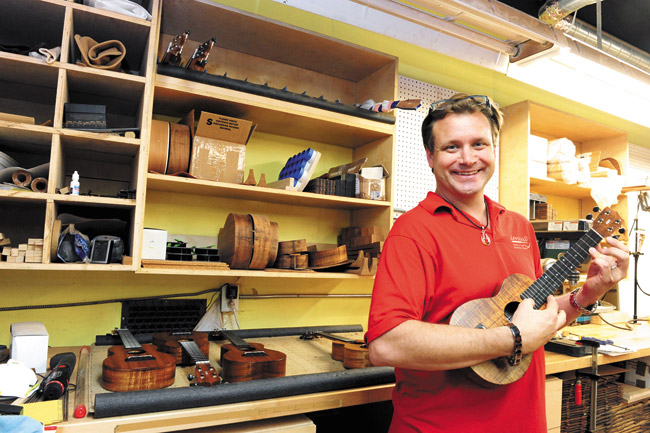Taking Big Risks To Create Koa Products
Every couple of months, JACY Inc. president Jorma Winkler collects koa wood from the upper slopes of Mauna Kea and Mauna Loa on Hawaii Island, where in place of roads, there is rough terrain laden with lava tubes and mud pits. Plus, there is the inherent danger of logging itself – one mis-step and the tree could fall the wrong way. But it’s all worth it, Winkler says, to gather koa, which he utilizes to create a number of products through JACY’s three companies, which manufacture various koa products. In 2012, JACY launched IMUA Ukulele, which produces hand-crafted koa instruments.
“Koa itself is one of the most beautiful woods in the world,” Winkler says. “We are very fortunate that it only grows in Hawaii.”
More recently, IMUA has partnered with Hilo Hattie, and in November it opened its own Makai Woods store at Hilo Hattie on Nimitz. In Makai Woods, customers can find traditional koa ukuleles and other koa accessories including jewelry, boxes, clocks and more.
Winkler’s dedication to koa runs in his family. He grew up on the Big Island, where his father was a koa logger. As a boy, Winkler often would ride along with his father on logging trips. Although Winkler never had any real interest in the industry in his youth, he returned to it as an adult after a stint of owning and operating an English language school in Japan.
In the early 2000s, he founded Winkler Woods, selling raw wood to instrument manufacturers. One of the keys to expanding his business has been identifying holes in the market and filling them. Through this philosophy, JACY has come to incorporate a diversified set of koa goods.
With IMUA, Winkler hopes to provide a “legacy instrument” – something that buyers can pass down to their children and great grandchildren.
“Certain instruments like certain woods,” Winkler says. “We are lucky that koa has good tonal qualities. The ukulele was made in Hawaii and they used koa, so if you want to replicate the sound of the original ukulele, you still should use koa.”
Also available at Makai Woods is a line of eco-friendly products that make use of extra koa pieces that otherwise may have been discarded. In his office, for example, is a slightly damaged piece of wood he has turned into a flower holder. Because Winkler works with his pieces “from tree to end,” he can’t stand the idea of any koa going to waste.
“Imua” means moving forward, which Winkler says aptly sums up his business philosophy.
“That is what we are doing – we are moving forward and trying to make improvements every step of the way,” he says.
coconnor@midweek.com






